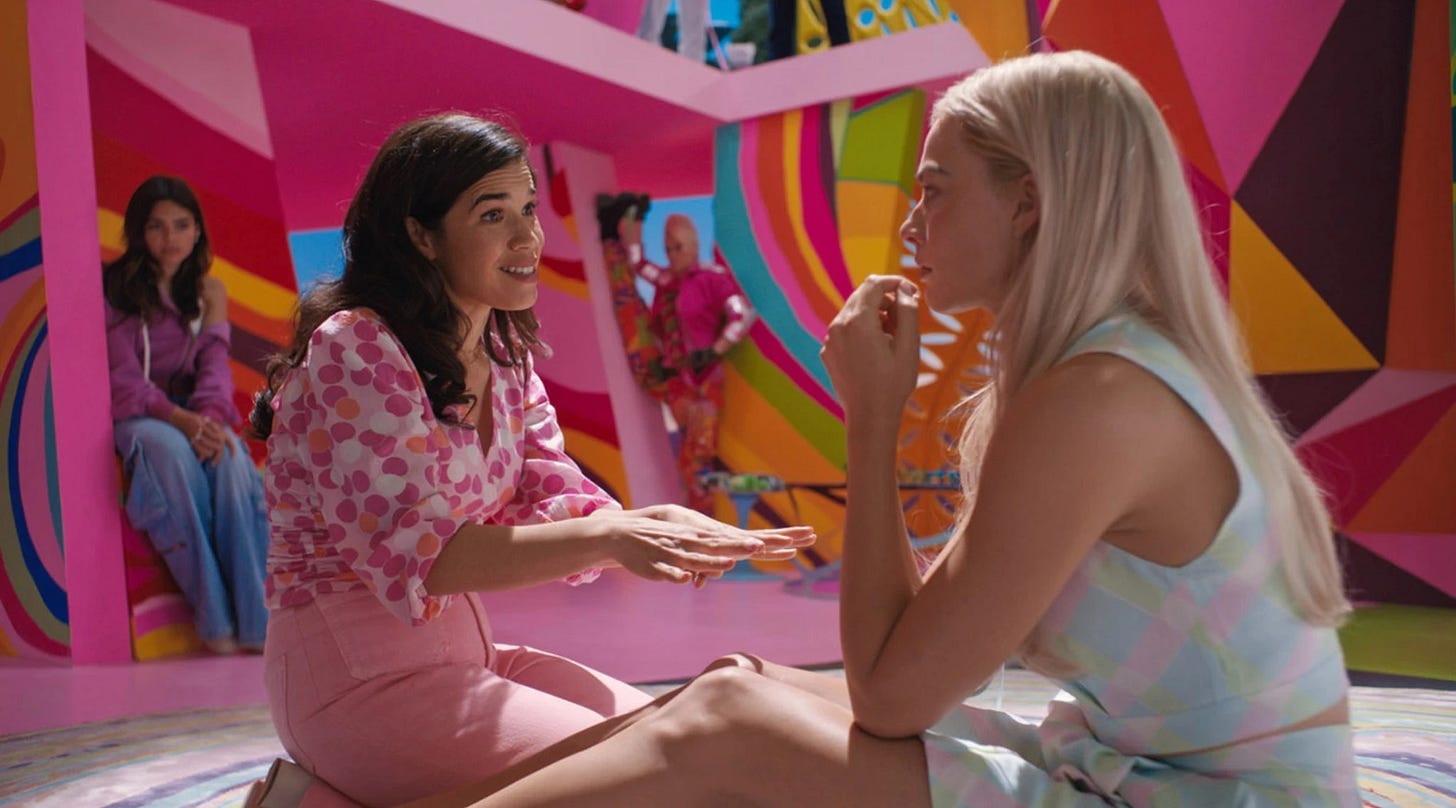This Film Is Not Your Mother
America Ferrera’s monologue in Barbie is a moving speech on womanhood that reveals the earnest concerns of the film. But it’s not a lesson.
This essay was originally written for Vulture/New York Magazine. But ended up not being released because of timing and editorial decisions. I re-read it and made some adjustments. In doing so, I realized how much I like the essay so I decided to publish it here. This newsletter will remain free for now. But if you enjoy this newsletter and want to show support, my Venmo and Paypal are @angelicabastien. This would be very much appreciated especially as I am saving for a July 1st move! Thank you for engaging with my work and I hope life is treating y’all gently.
The America Ferrera monologue in Barbie is a talismanic masterclass in alchemizing the concerns of the film by tapping into currents of deep feeling. But like the larger story itself — directed and co-written by Greta Gerwig — it has become a battlefield over which our knotted beliefs about womanhood, identity, and even the state of the American film industry play out. It’s too easy to cast aside the success of Barbie with cynicism, deeming its feminist efforts frothy and rudimentary. When I watched the film opening night with a packed audience, the room fell to a hush as Ferrera’s monologue revved up. When it ended, the audience erupted into swooning applause. Barbie is clearly tapping a vein that deserves to be charted and considered.
The monologue occurs at a crucial point in the film. Barbie (played by incandescent star-producer Margot Robbie) and Ken (Ryan Gosling in a Looney Tunes himbo turn) have traveled to the real world to confront the young girl playing with Barbie, in hopes of figuring out why the doll’s life of plastic suddenly includes cellulite and thoughts of death. But it isn’t the sharp-mouthed teenage girl, Sasha (Ariana Greenblatt), that proves to be Barbie’s porous connection to the real world. It’s Sasha’s mother, Gloria (Ferrera), a lonely administrative assistant working in the gruel-gray offices of Mattel, who’s been playing with her. Barbie is eager to bring both mother and daughter to Barbieland, a world so unlike their own. A world free of death and aging, where women and their desires are the sun that everything else orbits. But when Sasha and Gloria arrive, they find that Ken has returned first and gleefully brought the patriarchy back with him. What Barbie’s guests encounter is a world inverted. President Barbie and Doctor Barbie have turned into caricatures eager to hand men their brewskis. If Barbie was already dealing with an existential conundrum, she falls into a full-blown crisis.
Can you blame Barbie? After all, she is a woman witnessing the patriarchy up close for the very first time. Unlike Gloria and the women watching this movie, Barbie hasn’t been inundated with the pains of gender inequality since birth, and slowly brought into an understanding of its scope and horrors. She is thrust into it, experiencing its effects and understanding the totality of its existence at once. Cue Gloria’s monologue, which starts as an intimate conversation between her and Barbie. But soon, Gloria becomes the focal point of the frame, a final mouthpiece for the film’s preoccupations to this point. Robbie’s Stereotypical Barbie has been stripped of her glittering artifice: “I’m not good enough for anything,” she says. Gloria kneels next to her on the floor, acid bright angles silhouetting them. A host of other Barbies stand around them, but the camera stays trained on the planes of Ferrera’s and Robbie’s faces.
“It is literally impossible to be a woman,” Gloria says with mirthful, knowing laughter. “You are so smart and so beautiful and it kills me that you don’t think you’re good enough.” The camera moves into a medium shot, revealing the entirety of Gloria and Barbie’s bodies. Barbie peeks out from behind her hands, no longer content to just cry. Once Gloria gets to the line, “You have to be a boss but you can’t be mean,” she stands. Her voice rises an octave. Her presence broadens, her body becoming the frame’s lone gravitational focus
She’s not just emboldened, she’s angry, evident in the line, “You have to answer for men's bad behavior, which is insane, but if you point that out, you're accused of complaining.” Ferrera leans into the word insane, speaking it with a harshness. Turning it brittle. Her voice rises more, almost to the point of cracking. “You're supposed to stay pretty for men, but not so pretty that you tempt them too much or that you threaten other women because you're supposed to be a part of the sisterhood,” she continues.
Here, Ferrera’s eyeline shifts from Robbie to the other Barbies in her periphery. It is no longer a conversation between two people, but a speech meant to rouse buried emotions in everyone present. Ferrera moves her hands with staccato rhythms, as if underlining the point of each word with observable force. Her eyes roam the Barbies; she is giving voice to the contradictions they’ve all now witnessed. “You have to never get old, never be rude, never show off, never be selfish, never fall down, never fail, never show fear, never get out of line,” her palms jut out, as if she’s supporting the actual weight of what she’s saying, the unending requirement for women to be likable and easy to consume. “It's too hard! It's too contradictory and nobody gives you a medal or says thank you!” she says, finally reaching the pitch of a scream.
She then settles her voice and body, as if on the precipice of finding peace. “And it turns out in fact that not only are you doing everything wrong, but also everything is your fault.” Ferrera brings herself back to Robbie’s eyeline, crouching toward the floor again, “And if all of that is also true for a doll just representing women, then I don't even know.” It all ends in a place of uncertainty. Ferrera can’t provide a neat answer for Barbie, because there is none.
Barbie operates marvelously on the level of metaphor, but stumbles when it comes to specificity. While I loved that the film made Gloria’s emotional life a focus by turning its gaze toward mother-daughter relationships, that we don’t know the particulars of Sasha and Gloria’s friction means that the final notes of sweet camaraderie they share don’t hit as hard as they could. The tension between them as a mother and daughter is formless. Their emotional lives are implied rather than fully understood. In strengthening the relationship of Gloria and Sasha, the film could have provided a more barbed counterbalance to the saccharine mother-daughter-adjacent relationship Barbie shares with her maker, Ruth Handler (Rhea Pearlman). This would have made the end note for Barbie entering into that wondrous burden of mortality resonate more acutely. The monologue is a catalyst as it taps into an ocean of real emotional resonance for the girls who stumbled through the misogynistic wreckage of the 1990s and early aughts as much as it considers those currently in their teens and twenties as the film’s primary audience. In doing so, Barbie is at once a satirical, self-aware ad for the doll’s cultural legacy and a sincere exploration of the figure’s obliterating blonde whiteness. Gerwig argues there is worth to be found in her story, and her place within culture, despite these frictions.
Barbie also acts as a brilliant metaphor for a woman’s evolution from baby pink childhood to a reaffirmation and redefinition of the self that women like Gloria reckon with in their thirties and beyond. The speech isn’t feminism 101 because it isn’t meant to teach those in the audience a moral and political lesson. We are audience members interpreting a world, neither conduits nor students in some sort of cinematic classroom. Instead, her monologue is an emotional treatise meant to usher Barbie into a greater understanding of herself and the worlds she inhabits. The film, in turn, asks us to reconnect with our younger selves that were first grappling with a greater understanding of how the world is built to work against girls and women, especially. It’s not that women — and what they create — can not be faulted or ever make mistakes. There are issues within the film that deserve to be considered. Especially, a year out as those involved in the making of the film and Hollywood at large took the worst lessons from its mammoth success. (Seriously, we don’t need toy-related IP movies. What Barbie should have cued Hollywood into is that people are hungry for ecstatic, joyful cinema that doesn’t heed expectation but finds new avenues of aesthetic and emotional exploration. But Hollywood is dying. Let it rot!) The monologue is meant to propel the narrative forward, tap into an ocean of real emotional resonance, and encapsulate the film’s curiosities.
To enjoy Barbie is to realize ending the patriarchy is possible in Barbieland in ways that would never hold true in reality. Ferrera’s monologue doesn’t impart a lesson, so that you, an audience member, can take from her what you need in the real world. A film is not your mother. It shouldn’t be designed to speak to you and only you in simple, clear, politicized moral lessons that you then take into the world. It shouldn’t hold your hand gently, treating you to characters who exist within clear moral delinations where the boundaries of good and evil, bigoted and leftist are always neatly defined. Nor should a film be a mirror meant to reflect the totality of experiences under the umbrella of womanhood. That is far too much for any piece of art to bear. If the primary prism you understand a film through is how you personally relate to it, see yourself in it, and what it has to teach you, you’re asking the medium to do what it isn’t meant for. It is not a medium primed for teaching so much as enrapturing, even as political messaging is smuggled under the surface of every film no matter how inconsequential they may seem. But the limitations impressed upon women no matter their desires and station is something Gerwig uncovers with impressive alacrity, whether in her work as an actor (Frances Ha and 20th Century Women) or as a writer/director (Saorise Ronan’s monologue in Little Women is a crucial point of comparison). Even then, it’s important to look at Barbie within a wider history beyond an auteurist focus.
Glamour and truth found in aesthetic artifice is what the women’s pictures that flourished in the 1930s through the 1950s did, starring Barbara Stanwyck, Joan Crawford, and Katharine Hepburn in films like Stella Dallas, Clash by Night, Humoresque, and Sylvia Scarlett. They took seriously the aesthetic, intellectual, and emotional concerns of the modern (white) woman, and told stories as joyous as they were complicated — of fabulously dressed women wrestling with the boundaries of societal expectations. As film historian Jeanine Basinger argues in A Woman’s View, “The woman’s film was successful because it worked out of a paradox. It both held women in social bondage and released them into a dream of potency and freedom.” In these films, male co-stars bent to the whims of the women at the top of the marquee. Robbie’s Barbie isn’t a modern girlboss, she’s the latest in a lineage of ever-evolving, glamorous leads of women’s pictures. Like the women’s pictures before it, Barbie is riven with contradictions that excite, infuriate, and inspire.
Ferrera’s monologue has been likened to the prickly sociopath Amy Dunne’s infamous Cool Girl speech from David Fincher’s 2014 neo-noir Gone Girl. The only dynamic these monologues share is that they are both performed by women. Amy has the sickening appeal of a quintessential girlboss using the patriarchy to her advantage to get everything she desires. Who cares about the collateral damage? Her monologue damns women for playing a losing game. Yes, the Cool Girl speech holds many pleasures. It is propulsive, slick in its gimlet-eyed cruelties. But while Amy Dunne’s speech argues that femininity is a farce, Gloria’s speech suggests feminine excess has value.
Gloria’s speech didn’t remind me of Amy Dunne’s as much as it reminded me of Margot Channing’s in All About Eve. Bette Davis plays Margo, a grand dame of Broadway hitting her forties and spiraling in a world that doesn’t see value in older women. In the backseat of a car, wrapped in mink , Margo launches into a lament on the nature of womanhood. “Funny business, a woman's career - the things you drop on your way up the ladder so you can move faster. You forget you'll need them again when you get back to being a woman. There’s one career all females have in common, whether we like it or not. Being a woman. Sooner or later we’ve got to work at it. No matter how many other careers we’ve had or wanted.” She’s rueful and seething and concerned about her future possibly untethered to a man. With those searchlight eyes, and a cigarette in hand for maximum punctuation, Davis brings the full force of her talents to the scene. “Slow curtain. The end,” she says in close-up, taking a meaningful drag of her firmly held cigarette. Davis’ monologue limns the constrictions and contradictions of womanhood. Namely, it slyly exhibits the ways womanhood is defined not by what the singular woman is experiencing herself, but how her presentation of womanhood is considered by those around her. Do I agree with Margo’s fears? No. But it’s a titanic achievement of acting that takes us into the labyrinthine headspace of a woman at a crucial turning point in her life.
In an essay from feminist film journal Another Gaze, Rebecca Liu begins her critique of Barbie, “The idea that femininity is a performance that alienates the subject from herself has gained even greater ground in the age of reality television, the infinite scroll and the self as a brand, with all the blurring between the ‘artificial’ and the ‘real’ that such endeavours entail. At the same time, our world is in ever-greater thrall to the seductions of the image, and the rewards of a successful femme performance – if reports of influencer earnings are to be trusted – are astronomically high. It’s nice, then, to have a chance to return to the original sinner, the doll that started it all. Barbie showed countless girls the way to earn, if not love, at least its cheaper corollary, attention, by being thin, blonde, beautiful, bad at maths.” Hyper-femininity here is presented as an unquestioned power, in which desirability and individualism are in the sway of a specific brand of beauty. To portray the hyper-feminine as anything but a double-edged sword for women is to erase how this supposed power is often used against the very women who wield it. It’s a purely situational and conditional power with a time limit. To render gender — and in this case, the hyper-feminine — as mere performance bars us from understanding the complex forces that bear upon gender.
As Marxist feminist scholar Silvia Federici writes in Beyond the Periphery of the Skin: Rethinking, Remaking, and Reclaiming the Body in Contemporary Capitalism, “Performance is a useful concept. But its range of application is a limited, partial one. The concept suggests passive obedience to a law, enactment of a norm, an act of consent. In this [way] social identification as a woman becomes almost inevitably a self-inflicted wound.” By casting all gender expression as performance we elude the economic, social, and existential factors that produce these conditions. The feminist movement for women’s liberation couldn’t have been ushered into existence if gender was seen as only performance then. Federici continues, “In other words, “woman” is not a static, monolithic term but one that has simultaneously different, even opposite and always changing significations. It is not just a performance, an embodiment of institutional norms, but also a contested terrain, constantly being fought over and redefined.”
What fuels Gloria’s monologue and Robbie’s performance is a belief in the worth of the category of “woman,” a belief in the place the hyper-feminine has therein, in all its excessive, contradictory, and unruly nature. Gloria’s speech is not a lesson whose importance is rooted in what it can teach audiences. It’s an emotional exhale. There is a fallacy in the modern age about consuming “perfect” media that directly reflects your own political beliefs, with characters that are easy to root for and pose no pesky contradictions that the reaction to Barbie lays bare. It’s a monologue that isn’t poised to give us the answers we can’t find in life about womanhood, power, and identity. It, instead, glimmers with the kind of uncertain hopefulness that the closing moments of the film reflect — with its gynecologist joke and refusal to peg the newly human Barbie to any one profession. The strength of Gloria’s monologue is, ultimately, in how it engenders us to ask different questions about the very topics Barbie wrestles with by following the course of the emotional rivers it opens up.








Angelica, as always, you write with the playful, curious eye of someone I want to talk about movies all day with. Love your comparison to women's pictures/Margo Channing!
this was such an interesting take and it made me more curious about this film than i have been up to this point. i have certainly fallen into the trap of wanting every piece of media to reflect a specific moral center (which i think is more about my general dissatisfaction and anger with humanity right now), but that tends to spoil my experience of art these days. i feel like you *get* the heart of criticism!